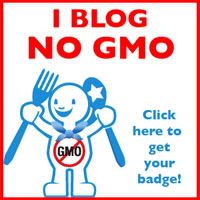 There is no more important single thing we can do to have a bigger impact on helping the planet and our bodies than choosing real organic foods.
There is no more important single thing we can do to have a bigger impact on helping the planet and our bodies than choosing real organic foods.Organic foods are produced without the use of chemicals, herbicides, fungicides, petroleum-, sewage- or sludge-based fertilizers or chemical pesticides. Organic food is not bio-engineered, genetically modified, nor is it irradiated. Poultry and Beef are fed only organic feed, are grazed on organically maintained pastures, and are not given antibiotics, hormones or animal by-products.
Until WWII, organic was the "conventional" practice as it was the most common way to farm. The use of synthetic chemicals and toxins won the battle away from home and were now touted to improve our lives here too. With this fanfare, it was well received and pushed through quickly. At that time, shocking to us now to think, but chemical poisons were even sprayed directly onto children to kill off bacteria! And some of us still remember walking behind the trucks spraying chemicals to kill off mosquitoes and other bugs around the neighborhood because it was so cool to see that puff of smoke come out. Conventional, the norm, changed to today's standard of using these chemicals readily.
Conventional farmers use millions of pounds of pesticides each year, much of which ends up in our drinking water and oceans. Pesticides and chemicals kill off living things - bugs and animals that may eat the food as well as parasites and microorganisms. Pesticides deplete the soil so more chemicals are needed to fertilize enabling the cycle to continue.
Pesticides are poisons. Most have the potential of causing cancer and are endocrine disrupters that mimic or interfere with our hormones. Pesticides cannot always be washed off the food, even with soap, as they are "ingested" in the plant through the roots and are actually in the body of the food.
Pesticides have a well documented and serious impact on our health. Among the many adverse effects, pesticides:
- compromise our liver's job of cleaning toxins from our body
- compromise each cell's ability to produce energy and do their respective jobs in our body
- compromise our nerves and their job of sending important messages in our body
More recent news suggests that conventional foods may help us keep unwanted weight on our bodies. We all know the liver's function is to clear our bodies of toxins. The latest research indicates that the toxic buildup burdens the liver's function to such an extent that it cannot do it's other important jobs - burn body fat! An impaired liver can therefore cause weight gain.
Organic farmers are leaders and innovators at protecting our environment while protecting the crops naturally. Organic farmers work with the natural ecosystem to improve the soil and deter pests. They rotate crops between fields and have diversity in their farms; while the conventional farmer limits crops and farming practices which depletes the soil's nutrients and leads to a real risk of crop damage from disease.
Organic farmers plant certain flowers and bushes to attract helpful insects who will then eat or deter pests that might otherwise eat the crops; conventional farms kill off insects and pests, helpful and hurtful to the farmer.
Organic farmers work with nature to replenish the soil, do not use toxic pesticides or fertilizers and maintain a biologically sustainable investment in our future. The organic farmer works to create and maintain healthful soil. Worms and microorganisms work to keep the soil strong. The soil feeds the plant. Therefore healthful soil creates food with more nutrition. True, conventional food is devoid of harmful bacteria and bugs, but it is also lower in nutritional value and has less flavor.
Chemicals deplete the top soil and cause soil erosion which in turn offers less nutrition to the plant which in turn creates less nutritious food for us. In addition, the chemicals and pesticides are killing off microorganisms. Many of these microorganisms are helpful and are actually healthful. Discoveries of helpful bacteria that turn into cures for disease are found in dirt regularly around the world. In killing off the good and bad organisms, we are creating new super-resistant bugs and strains of insects and pests that require even more powerful chemical pesticides to be killed.
Healthy plants are more disease resistant, are more drought resistant, create a better supply of food, create more nutritious food, and grow strong without chemical assistance. It all works together.
At home, our own yards can be maintained organically. Years ago, we would to play in the dirt, dirt that was free of harmful chemicals and loaded with helpful microorganisms. As children this set up our immune systems to be strong. Children were healthier. When our children run and play in the yard, we need to make sure that is a yard they can lie in safely and that runoff from our yard is not going to poison our planet and water supply.
Conventional farming overseas is even worse than in the U.S. since farmers can get away with more with relaxed environmental laws. In many countries, conventional farming is destroying the rainforest and causing the demise of plants and animals for the sake of one single kind of "cash" crop ki. Forests are plowed to make way for planting, soil is eroded, chemicals and poisons enter our water systems, animals lose their homes, toxins enter the delicate ecosystem.
And talk about doing our part to help curb global warming, conventional farming uses more fossil fuels. Fossil fuels are used to create pesticides and chemicals. They are used to transport them to the farm. Micro-organisms that would otherwise hold carbon are killed releasing carbons into the atmosphere. Once the soil is depleted of micro-organisms, the soil must be enriched with chemical fertilizers which again take fossil fuels in creation and transportation. Conventional farms are more automated and use more fossil fuels generally. They have an over-abundance of manure since they are not using that so that is another issue which must be removed with fossil fuels. Organic farming uses up to 60% less fossil fuel per unit of food.
What is Biodynamic? Biodynamic Demeter supervised farming meets all organic standards and takes them even further. This system was created in ancient times to create healthful soil to withstand the test of time. Biodynamic farming takes even more time and money and therefore things cost more, but what it gives us is a true harmony with our land. It works with the plants, animals, and the environment to promote healthy soil and healthy plants.
Choosing organic produce and biodynamic products supports local, generally smaller, organic farms and the families who work those farms. Paying organic farmers in other countries a fair wage by choosing Fair Trade products allows them to create strong communities, schools and help children and their families. In addition, and as you would guess, conventional farmers and the people that work in and around the fields (including the people that crop dust and spray the chemicals and pesticides) have a much higher risk of cancer than organic farmers.
Organic certification confirms a set of standards:
- farmland used to grow the produce must be free of chemicals (pesticides, fertilizers, etc) for at least three (3) years. During the three year period, they are considered "transitional" and before that they are simply conventional.
- there is a paper trail to make sure that product is indeed the organic product you expect.
- organic poultry and beef are raised on organic feed or organically maintained pastures
- organic cows and chickens cannot be given growth hormones, stimulants or antibiotics
- organic dairy cows, poultry and cattle must be treated humanely with
o clean water,
o a clean place to sleep,
o access to the outdoors,
o exercise, and
o fresh air - organic dairy pasteurization must meet hygienic standards
- dairy cows may not be sold for slaughter as beef
- beef is processed in a certified plant where organic cows are separated from conventional ones and the entire processing line must be cleaned to organic specifications for the organic ones
- no more than 5% of the ingredients (excluding water and salt) are conventional; or at least 95% of the product is organic as per the standards of certification
- organic products cannot use some organic and some conventional of the same ingredient
Understandably, organic can cost more than conventional, but remember that cheap is not food, cheap is a way to fill the belly that has expensive repercussions long-term upon our health and our planet. It's actually more expensive to produce cheap food, more energy is needed to create each calorie and the clean up of the mess made to our health and our environment is expensive. Instead choose organic whenever possible - particularly for those foods you feed yourself and family most. That will offer you the biggest impact on your own lives and is the best place to start.
Organic farming protects our water supply, our wild life, our families, and our future. Choosing organic foods is like voting to go back to a more natural and safer way of breathing, eating, and living. It's a vote for our health today, our children's current and future health, our environment, animals, and our planet.


























Buying quality organic products is the initial move to a healthy, natural, green lifestyle that can bring a good feeling not only to ourselves but as to our environment as well.
ReplyDeleteThanks for this great, interesting article! Organic food is always a good choice, for yourself, for your family as well as for our environment! If you want to know even more about organic food, I recommend this blog: custom-organics.blogspot.com
ReplyDelete